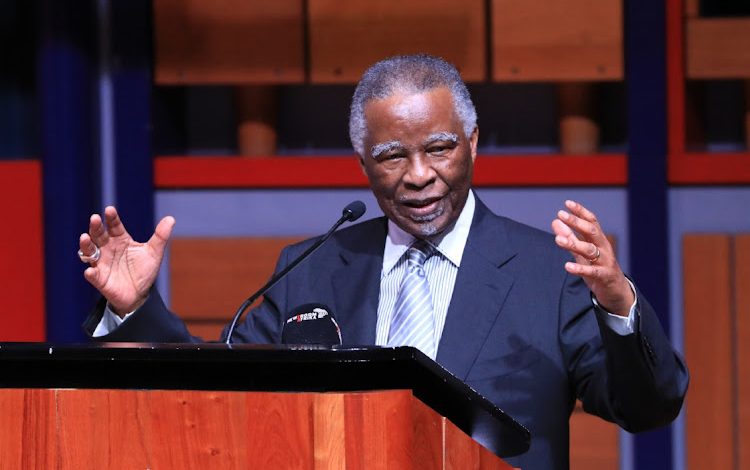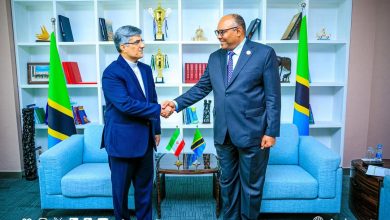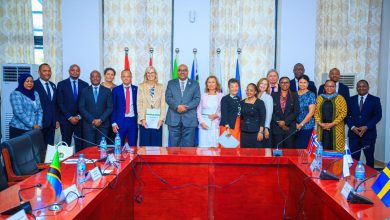Mbeki calls on Africa to set its own agenda heading to the G20 Presidency

DAR ES SALAAM: FORMER South African President, Mr. Thabo Mbeki, has urged the African business community to set an ambitious and unified agenda ahead of South Africa’s G20 Presidency in 2025.
Speaking at a High-Level Business Roundtable in Dar es Salaam, Mr. Mbeki emphasized the importance of addressing critical issues such as solidarity, equality, and sustainability, with a strong focus on Africa’s development.
The upcoming G20 Presidency, to be held in South Africa, seeks to confront interconnected global challenges, including poverty, unemployment, inequality, climate change, food security, and energy.
Speaking at the roundtable—jointly organized by the Thabo Mbeki Foundation and the Mwalimu Nyerere Foundation and backed by AngloGold Ashanti—Mr. Mbeki highlighted that, although various initiatives were pursued during his tenure, it is now imperative for the African business community to take the lead in shaping the continent’s global economic narrative.
The roundtable was held in Dar es Salaam as part of the 15th Annual Africa Day Lecture, convened with leading business figures, private sector representatives, academics, and diplomats. Mr. Mbeki urged participants to craft a cohesive African economic agenda for the global stage.
“We must be organised,” he said, “and speak with one voice on matters of concern.” Cautioning against past failures such as the stalled Africa Action Plan in 2010–2011, he called for well-structured, African-led policy proposals.
“We had several initiatives at G8 summits to champion the African development agenda by leveraging our resources. Now, with the African Union as a G20 member, we must seize the opportunity to drive our agenda forward,” Mr. Mbeki added.
The G20 Johannesburg Summit, set for November 2025, will mark the first time the summit is held on African soil—an important platform for advancing the continent’s interests.
Alongside the African Union, G20 members include Argentina, Australia, Brazil, Canada, China, France, Germany, India, Indonesia, Italy, Japan, South Korea, Mexico, Russia, Saudi Arabia, South Africa, Turkey, the United Kingdom, the United States, and the European Union.
ALSO READ: AngloGold, Thabo Mbeki Foundation partner to implement Africa’s Agenda 2063
During the roundtable, participants urged African nations to assert their interests and chart a development path based on their own rich resources, including minerals.
Renowned economist Professor Samwel Wangwe emphasized the need for African countries to return to principles of self-reliance and to reassess the role of the African Union.
He also advocated for African unity, the creation of a single currency, protection of natural resources, investment in business innovation skills, and the establishment of a conducive environment for economic growth through strong public-private partnerships.
Themed ‘Building Consensus for South Africa’s G20 Presidency, Reigniting Africa’s Renaissance ‘, the roundtable sought to formulate a united African business stance for upcoming G20 discussions.
Opening the session, Simon Shayo, Vice President of AngloGold Ashanti, called for a transformative approach to business’s role in development.
“We must be more than economic actors—we must become architects of Africa’s future,” said Shayo, reflecting on the company’s 25-year contribution to Tanzania’s mining sector.
Lukhanyo Neer, Chief Operating Officer of the Thabo Mbeki Foundation, echoed the sentiment, stressing the need for collaboration that transcends national and commercial interests.
“We need a united African voice in global economic forums,” he asserted.
Tanzanian Ambassador John Ulanga highlighted a critical challenge: Africa secures only a third of the infrastructure investment it needs. He proposed focusing on pan-African infrastructure projects, such as the Cape to Cairo corridor, and promoting practical trade facilitation mechanisms.
“Implementation must be driven by our heads of state—but rooted in African realities,” Ulanga stated.
Ambassador Ami Mpungwe called for a reevaluation of Africa’s development model.
ALSO READ: Mbeki calls on African leaders to observe honesty, integrity, genuine commitment
“Resources alone are not the solution—they are just the foundation,” he noted. Emphasizing the importance of investments in technology, capital, and talent, he cited South African foreign direct investment in Tanzania as a model of intra-African success.
Roundtable discussions also focused on critical sectors such as energy, trade, and agriculture. Speakers called for a shift from raw exports to value-added processing, citing high-potential crops like cashews. Youth empowerment and public-private partnerships were also highlighted as key drivers of economic growth.
In her closing remarks, Emily Kariuki of the Mbeki Ndlela Foundation invoked the legacy of Mwalimu Julius Nyerere.
“When Africa acts together, we are unstoppable—even in the toughest global arenas,” she said, urging participants to maintain the momentum.
The roundtable concluded with a strong commitment to building a unified and strategic African business platform for G20 engagement.
During the discussion, AngloGold Ashanti reaffirmed its continued support for such dialogues, pledging to remain a catalyst for inclusive and sustainable development across the continent.





